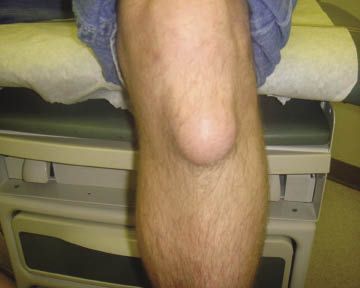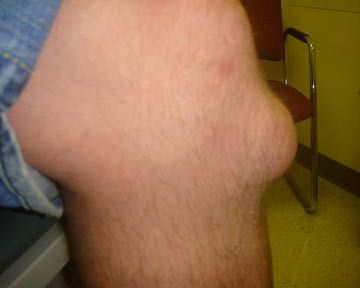- Clinical Technology
- Adult Immunization
- Hepatology
- Pediatric Immunization
- Screening
- Psychiatry
- Allergy
- Women's Health
- Cardiology
- Pediatrics
- Dermatology
- Endocrinology
- Pain Management
- Gastroenterology
- Infectious Disease
- Obesity Medicine
- Rheumatology
- Nephrology
- Neurology
- Pulmonology
Occupational Prepatellar Bursitis
For 2 months, a 29-year-old man had pain and circular, soft swelling (7 x 7 cm in diameter) over the anterior left knee, superficial to the patellar ligament. Pain was minimal and associated with extension and flexion.
For 2 months, a 29-year-old man had pain and circular, soft swelling (7 x 7 cm in diameter) over the anterior left knee, superficial to the patellar ligament. Pain was minimal and associated with extension and flexion (A and B).
For the past 10 years, the patient had been employed laying floor tile. A history of repetitive kneeling coupled with the pain on inspection and palpation of the bursa confirmed a diagnosis of prepatellar bursitis.

Prepatellar bursitis (also known as housemaid’s knee) is an inflammation of the knee bursa located between the patella and the overlying skin that presents with swelling but minimal discomfort.1,2 It is usually caused by trauma or friction from repetitive kneeling.

Management includes aspiration and drainage of bursa fluid, followed by the application of a compression wrap to the knee.3 Patients should be encouraged to avoid trauma and repetitive kneeling. The bursa fluid should be sent for culture, Gram stain, and evaluation for crystals and white blood cells. A corticosteroid injection may be considered for patients with recurrent or chronic bursitis. X-ray films of the knee are not required for a diagnosis and seldom affect management.
Most patients respond to aspiration and NSAIDs, as was the case with our patient. However, 5% to 10% of patients do not respond to conservative treatment and may require bursectomy.4 If kneeling cannot be avoided, it is recommended that patients use a kneeling pad or cushioned knee protectors and take short, periodic breaks. They may also apply ice to the area for 20 minutes, 3 or 4 times a day, as needed for pain. If the problem persists, a different profession that does not require repetitive kneeling may be considered.
References:
REFERENCES:1. Anderson BC. Office Orthopedics for Primary Care: Diagnosis and Treatment. 2nd ed. Philadelphia: WB Saunders Co; 1999.
2. Jackson JL, O’Malley PG, Kroenke K. Evaluation of acute knee pain in primary care. Ann Intern Med. 2003;139:575-588.
3. Dawn B, Williams JK, Walker SE. Prepatellar bursitis: a unique presentation of tophaceous gout in normouricemic patient. J Rheumatol. 1997;24:976-978.
4. Ogilvie-Harris DJ, Gilbart M. Endoscopic bursal resection: the olecranon bursa and prepatellar bursa. Arthroscopy. 2000;16:249-253.
Phase 3 Data Support Oral Orforglipron for Weight Maintenance After GLP-1–Based Weight Loss
December 19th 2025Topline Phase 3 ATTAIN-MAINTAIN data show oral orforglipron met primary and key secondary endpoints for weight maintenance after prior GLP-1–based injectable therapy in adults with obesity.
